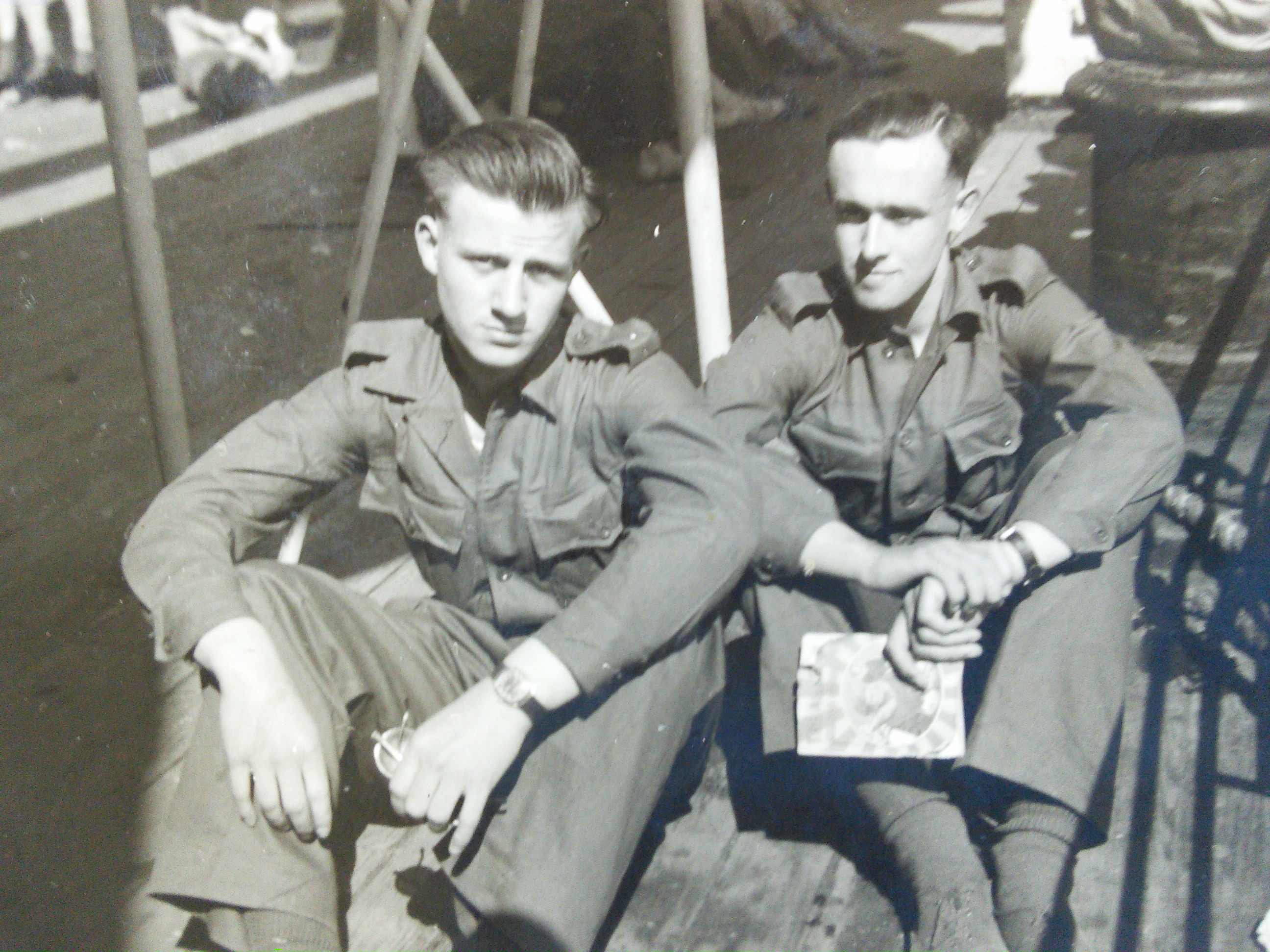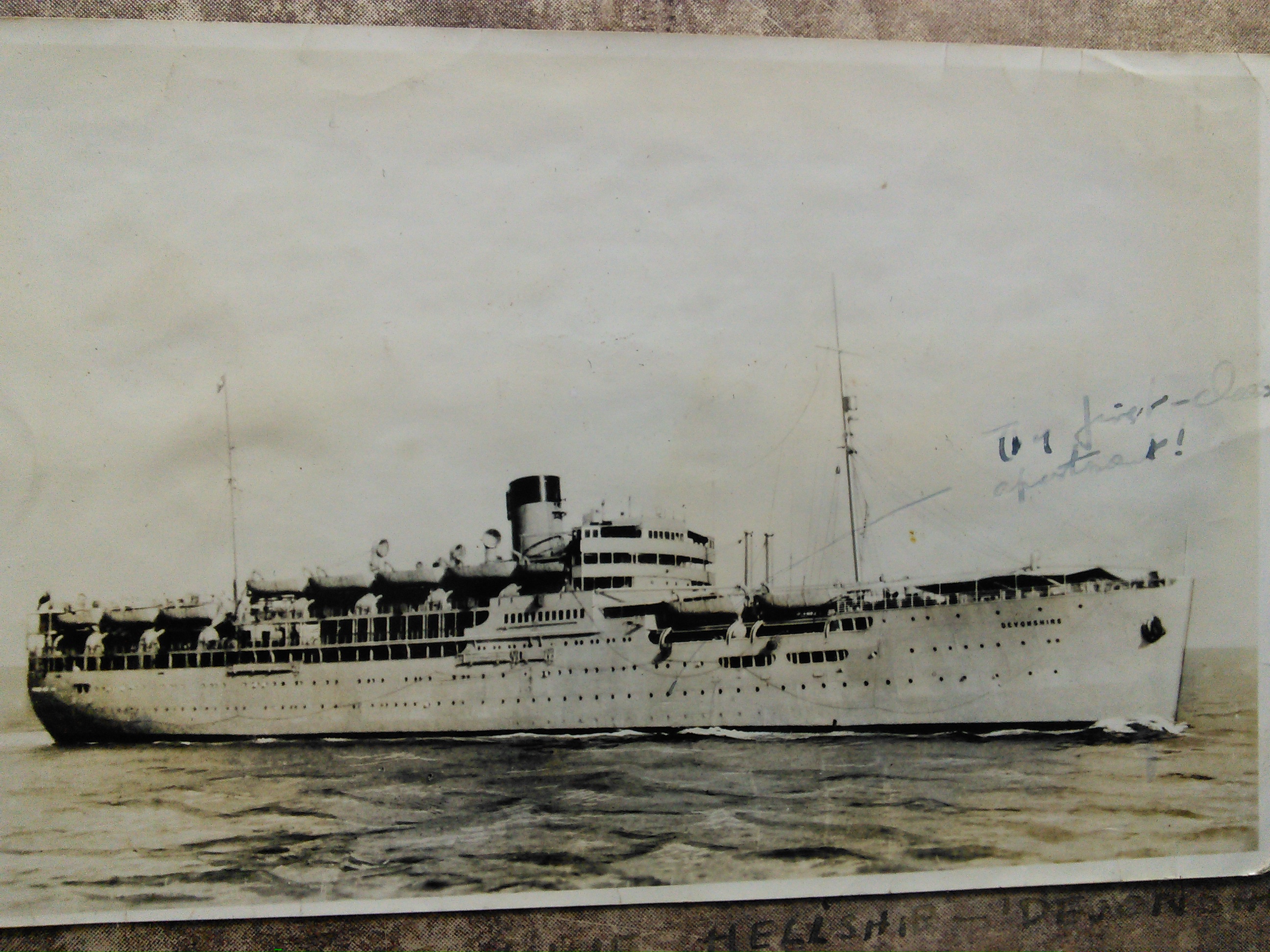
These articles are about the Army when I did my National Service. They were written with the aid of a five-year diary and later between working hours during early morning shifts.
A SOLDIER'S TALE (7)
We clattered up up the gangway into the Bibby Line "Lancashire" trooper which had been shifting soldiers about the world since 1937, and we were documented yet again. Then, staggering and slipping our way into the bowels of the ship, I looked around at the new and alien quarters which would be "home" for a month.
The troop-deck ran from starboard to port and was cluttered with tubes along the ceilings, and tubular steel stanchions supporting "standees" - our sleeping accommodation. Also, on the ceiling were long lengths of galvanised trunking pierced at interval with black swivel blowers. In one thing we were lucky; we had port-holes. The troop-deck below us didn't.
Having given my surroundings a cursory examination I turned my attention to my neighbours, and was delighted to find a couple with whom I had chatted desultorily in the underground barracks the night before: Mike Brooks, from Bournemouth and Johnny Gatcombe from Enfield. Both seemed likeable lads, and having renewed acquaintance we turned back to the accommodation.

The standees were basic hinged, tubular frames to which canvas was laced to provide a bed. The hinges enabled it to be folded back out of the way if necessary and, while not particularly comfortable, and giving little support if the ship was rolling heavily, it certainly solved the problem of sleeping a lot of soldiers in a confined space. If you turned over in the night you were liable to find yourself invading your neighbour on the other side of the framework - to his great horror and concern! The troop-deck probably accommodated some 100 men altogether. Kit had be stacked in racks along the deck under the portholes.
Obviously, with mixed company in such a confined space tempers tended to fray from time to time, and petty pilfering was rife. We thought this was probably due to the complete instability of our situation. In a normal billet, when characters become well-known over a long period , there was the unwritten code: "Knock off Army property if you like, but private property is sacred". However on the troop-deck, where the inmates came and went like globe-trotting passengers at the world's bus stops, such morals did not prevail. So if you omitted to padlock your kitbag, or lock your suitcase, you were asking for trouble.
The three of us then went to collect our bedding which, we joyfully noted, included a sheet, which after reflection, we realised that would be necessary in hotter climes. We then checked the next most important items: times of meals, reveille, lights out, parades, shop-opening (duty free fags at one shilling and eightpence (approx 8p) for 20. We were furnished with further information by the troop-deck sergeant, who told us, somewhat gratuitously: "Keep off the upper decks – they are for officers and their tarts, so don't say I didn't warn you". Later, we negotiated the steep companionway down into the warm cookhouse, where meal-sitting had to be staggered to accommodate everybody. It was surprisingly clean, with reasonable food, eaten directly off stainless steel compartmented trays.
Then, feeling comfortably fed, we hung over the rail to watch the Liverpool dockside and the famous Liver Building fade astern as the buoys blinked at us in the early spring dusk. We were silent with our own thoughts. Farewell UK, we're on the slow boat to China. See you sometime - if we're unlucky up the jungle...
Down on the troop-deck we found that lights out was something of a farce because one could read comfortably by the emergency lighting. I settled down in the unaccustomed surroundings with the slight swell combined with the quite gentle throb and vibration of the engines helping me sleep like never before.
The following day saw the beginning of shipboard routine which, at best, approached that of a cruise liner, and, at worst was irritating, and boring. Morning parade, boat stations, breakfast, fatigues, read, sleep, play cards, lunch, sleep, read, play cards, write letters, tea and shop opening, visit library, supper, read, play cards, and finally sleep again. The first day we sat around the deck enjoying the sea air, and, for most of us, the novelty of being aboard ship with its bells, its perpetual movement, and unfamiliar terms, was pleasurable.
But that was short-lived, for the Bay of Biscay lived up to its stormy reputation. Those of us still on our feet were slithering around in vomit and trying to sympathise with the unfortunate. It was wet, windy and rough. The troop-deck smelled sour and was full of recumbent, groaning bodies. Few of us braved the cookhouse for breakfast - or any other meal.
With the typical cynicism exhibited by the top brass of the armed services, the cookhouse was located in the bows of the ship and subject to the worst of the ship's heaving and wallowing. Some of us just managed to swallow a few bites before rushing up to the fresh air with a mug of tea and seeking a 'midships position on the crowded deck to avoid the worst of the motion. Ranks were decimated for the morning parade. And for some of those who actually made it, proceedings were punctuated by sudden rushes to the ship's rail.
This was the time when we realised the absence of doors on the latrines was really noticeable. It was merely embarrassing to gaze nonchalantly at the lad opposite in the next cubicle. Most of us took a book with us. But it was hell in the rough conditions when one's neighbour was unsure for which purpose he had visited the latrines.
Yet, when "Lancashire" ran into calmer weather, conditions improved, and after a brief pause at Gibraltar to land an unhappy appendix-stricken airman, we sailed on into the warm Mediterranean We brought bedding up from below decks into nooks and crannies round the main deck in order to sleep under the stars. Positioned carefully under a deck light one could read and smoke at a late hour.
A week or so, later, we passed the statue of de Lesseps, builder of the Suez Canal, and docked in Port Said. We were all eager to sample the delights of shore-going in a foreign country, but with hindsight, it seemed that Britain, in 1949, was happily letting loose so many shiploads of teen-aged soldiers all over the world armed only with an officially provided prophylactic or two and warned to steer clear of VD!

To be continued...